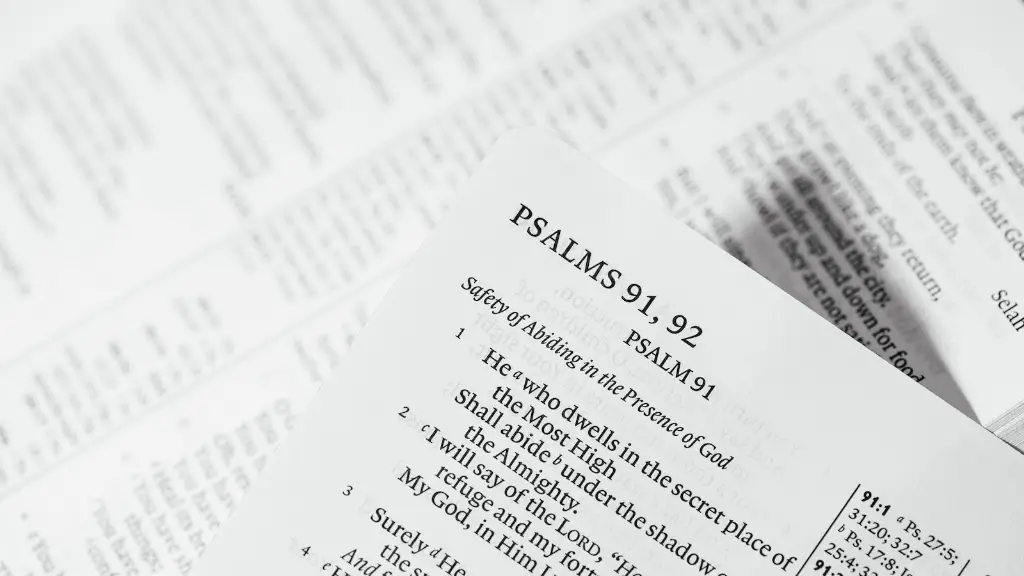For centuries, the Bible has been used to defend wars and justifications for entering conflicts. Whether it is with the intention of Christianising the mass populace or creating greater stability in regions of unrest, war has been an ongoing issue since the Bible was first compiled. When we first consider what the Bible says about war, it’s essential to take into account the fact that different interpretations occur. Even so, the Bible overwhelmingly preach non-violence and tries to bring people closer to God, through peace and injustice.
In the Old Testament, there is much history of conflict and war but that doesn’t necessarily mean that violence is the answer. There’s a distinction between the justification for a battle and the action of one. The Old Testament does tell of wars occurring, yet does not necessarily condone them. Most of the battles mentioned are in defence of Israel or against curses made by God through Moses. As the New Testament approaches, there is a spiritual teaching that preaches non-violence, even when physical violence is used.
For example, the Sermon on the Mount implies that those who act with physical violence will be punished by God. Likewise, there are passages in the New Testament that suggest that war is not a way to resolve violence. The result of this more spiritual approach is to not take part in malicious conflicts, and peace should be sought at all costs.
The Bible would advise the faithful to not take part in the hatred of war. Return evil with good, and practise forgiveness rather than revenge. Not responding in kind is a Christian-like quality, as stories such as David and Goliath taught through the Bible. In some circumstances, such as revolution, it may be best to fight back against an oppressive ruler, and God will understand the justifications for war.
The Bible would recommend that any act of defence is only taken after all other alternatives are explored. It is not right to attack first and only act out of vengeance or with hate in mind. To act out of hatred serves no purpose in God’s kingdom and doesn’t honour Him, or bring anyone closer to Him. In some cases compromise and peace may be the better option – especially if the end result will bring more peace into the world.
Peacekeeping and Intervention
In application to today’s global landscape, the Bible would recognize any intervention needed to prevent further suffering and death. This doesn’t necessarily mean that full-scale wars need to occur and involve large numbers of military personnel, but rather intervention could be achieved through means of diplomacy or peacekeeping missions.
The Bible supports peacekeeping undertakings, as it seeks to provide greater stability in regions of unrest. This can involve financial aid, infrastructure development, providing safe zones for the people in need, supplying food, and other forms of assistance. All of these are ways of intervening without having to declare war and involve any form of violence.
Peacekeeping forces can also take another form of protection; providing guard against any resources and land divisions that could lead to further unrest. By maintaining a presence in different regions, intervention forces can protect civilians and those without the means to protect themselves.
Religion and Culture
The Bible offers some of the finest examples of international diplomacy between two warring sides. Saul, the King of Israel, negotiated treaties with the Philistines, despite their differences in religion and culture.
In the Bible, peace is attainable through negotiation and understandingeach other. We have examples of when Jonathan shaved off his beard as a sign of a covenant, in which his people decided to leave certain areas and refrain from taking valuable resources. This does not mean that Bible encourages pacifism, rather that it offers a way to resolve conflict without resorting to violence.
The Bible ultimately argues for war to be used sparingly and only when necessary. If potential dialogues between two opponents can work effectively, it listens to reason and encourages non-violent solutions over war and violence.
Morality behind War
That said, different individuals may interpret the Bible in different ways. For some, war may be seen as an acceptable solution to resolve problematics. This could bring down resentment and is seen as righteous or honourable, if they are fighting in order to protect or defend themselves. Even so, God expects his followers to remain moral and take the right action when it comes to war, rather than acting out of anger or pure military aggression.
In conclusion, the Bible does infer warfare, yet does not necessarily condone it. War has been used for centuries for people to gain more power, even if it’s in the name of religion or a grievance. By understanding what the Bible says about war, as well as its morality, we can have a greater grasp of how to handle global conflicts, and strive for a peaceful world that respects human life and defends justice.
War and Protection
The Old and New Testament example of war is generally used for protection and to expel a foreign power. Yet, there are instances in the Bible which suggest war should not be the first option and should be used only in the most dire of circumstances.
At times war may be seen as a sign of strength and justice, providing protection to those who are being oppressed and allowing the God fearing individuals to go free. The Bible acknowledges war should be considered, but it should not be glorified. It’s an action that should be taken as a last resort and heeded with caution and respect.
Speaking from a global standpoint, no one can deny the ever-escalating risk of physical and economic harm war could bring to the world. For example, in the case of economic stability and resources, such as food and water, wars can lead to a disruption in the provision of these resources and cause overall economic damage.
Therefore, the Bible sends a strong message that we should live peaceably, if possible and be wise with the resources we have. This is why it aids believers in recognizing biblical messages of peace and how we can live our lives with respect and caution without having to resort to war.
War in Relation to Christianity
The Bible does not necessarily tell us what to do in every situation, but it does equip believers with the knowledge to identify what is good and righteous over what isn’t. When it comes to war, it calls for believers to pursue peace at all costs and to protect the innocent and powerless. To go to war is ok if there is nothing else that can be done, but believers must take caution in their approach to understand the gravity of their choice.
That said, it’s not the role of believers to judge those who go to war and even those who show the signs of strength in the Bible. At its very core, the Bible follows the notion of non-violence and encourages its followers to love one another and act with patience and compassion. As long as these qualities are present then believers may use their judgement to pursue their own course of action that reflects their beliefs.
In following the teachings of the Bible, war should only be taken when no other solution works in protecting. This doesn’t mean that believers should bear arms, but rather they should strive to understand what’s right and act in accordance with their beliefs. By taking a moral stance in the face of war, believers can still be part of a larger solution.
Living Out Peace and Love
The Bible speaks a great deal about loving others and treating them kindly, no matter their background or beliefs. It would advise us to use diplomacy rather than brute force and show mercy to our enemies. Love, more than anything else, should be our response to our adversaries.
That’s why the Bible encourages believers to have an active role in being peacemakers. Rather than being content with staying neutral, they should attempt to become the bridge between two warring sides. This can be done through negotiations, setting up meetings, or providing mediation services.
Christians should take action and respond to any plans of war in real and measurable ways. This might include spreading education and awareness, speaking up against oppression, or providing protection to those in need. As well as this, Christian communities should also provide any assistance needed, such as food, medical help, and psychological support.
Regardless of beliefs or backgrounds, the Bible encourages peace and understanding between human beings. It was written in the time of war and violence, but still managed to provide individuals with the moral compass of understanding. To believers, it’s a guide on how to live life with respect and open-mindedness, and seek peace in any conflict.





